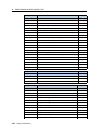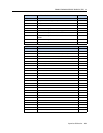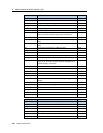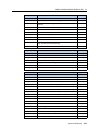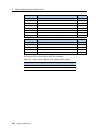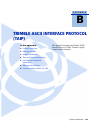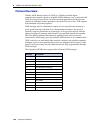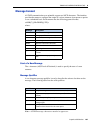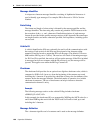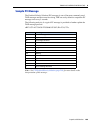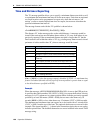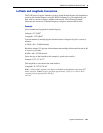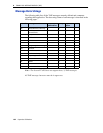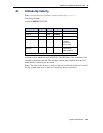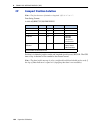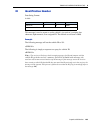
B TRIMBLE ASCII INTERFACE PROTOCOL (TAIP)
188 Copernicus GPS Receiver
Message Identifier
A unique two character message identifier consisting of alphabetical characters is
used to identify type messages. For example: PR for Protocol or VR for Version
Number.
Data String
The format and length of a data string is dictated by the message qualifier and the
message identifier. The data string may contain any printable ASCII character with
the exception of the >, <, and ; characters. Detailed descriptions of each message
format are provided in the specific message sections of this Appendix. Most messages
are length sensitive and unless otherwise specified, field separators, including spaces
are not used.
Vehicle ID
A vehicle identification (ID) may optionally be used in all the communications with
the receiver. Each receiver in the fleet may be assigned a four character alpha-
numeric ID and be forced to output that ID in all messages. The default is: ID set to
0000 and the ID Flag set to F (false). The receiver will check all incoming messages
for ID. If no ID is specified, the receiver will accept the message. If the ID is included
in messages but does not compare with the ID previously set, the message will be
ignored. This applies even when the ID Flag is turned off.
Checksum
The checksum field provides for an optional two digit hex checksum value, which is
computed as XOR of all characters from the beginning of the sentence up to and
including the * character. If provided, the checksum is always the last element of the
sentence before the message delimiter. The default mode of operation is to include
checksum in sentences. The use of checksums can help in instances where the
communication channel is noisy.
Example
The following message used to set the vehicle ID flag includes checksum.
>SRM;ID_FLAG=T;*6F<
In this example, the checksum (6F) was generated by XOR'ing the ASCII codes for >
and S then XOR'ing that result with the ASCII code for R and so forth, up to and
including the * character.
Message Delimiter
The < character signifies end of a sentence and is used as the message delimiter.



